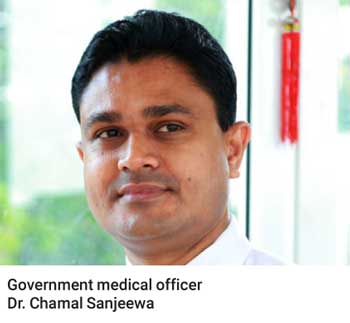Wednesday Feb 25, 2026
Wednesday Feb 25, 2026
Tuesday, 30 May 2023 01:56 - - {{hitsCtrl.values.hits}}
 The Supreme Court has held that State sector officials cannot legally provide statements or comments to media organisations without obtaining prior permission from their superiors.
The Supreme Court has held that State sector officials cannot legally provide statements or comments to media organisations without obtaining prior permission from their superiors.
The decision was made in relation to a fundamental rights petition filed by Government medical officer Dr. Chamal Sanjeewa against his suspension by the Ministry of Health for providing a statement to the media regarding malnutrition rates among children in Suriyawewa in 2022.
Dr. Chamal Sanjeewa at the time claimed at least 80% of the children attending the health clinic in the area were suffering from malnutrition. The comment drew widespread alarm and concern about the well-being of the children.
Later on 1 November 2022 the Ministry of Health suspended Dr. Chamal Sanjeewa over the comments the Ministry said were baseless and caused embarrassment to health officials, following which the doctor filed a petition before the Supreme Court seeking an order declaring his suspension against the law and therefore void.
The doctor had told the courts his comments were made for the benefit of society and had no intention to cause embarrassment to health officials as alleged. However, the Attorney General’s Department said basing his opinion on a clinic attended by a mere 20 children violated the law and was also baseless.
Following considerations, the Supreme Court held that According to Article 31: 1: 5 of the Establishment Code, a public official must obtain the approval of his department head or institution head before publicising any information.
The Supreme Court noted that “Under Section 6 of Chapter XLVII of the Establishment Code, before releasing official government information to the media or the public, public officials must obtain approval from the head of the department or the secretary of the ministry. According to Section 7:2 of the same chapter, no public official should publish a book, publish articles, or issue statements to the media without obtaining the approval of the head of his institution.”
The court dismissed the case and found that the petitioner had not obtained the necessary approvals, and he has therefore failed to prove his fundamental rights have been violated.